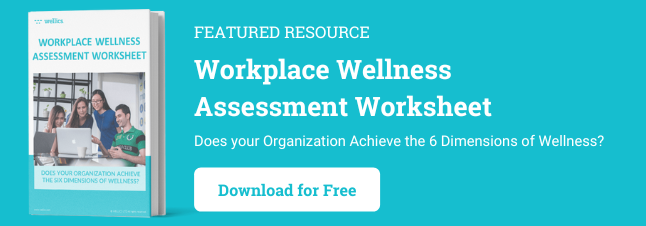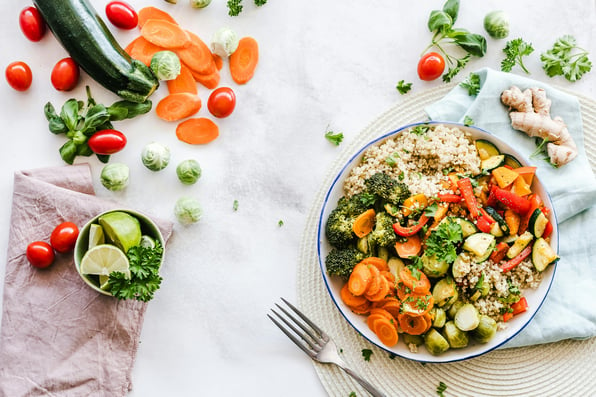Have you ever felt your energy is so low that it impacts your productivity, even if you’ve already drunk too much coffee?
Many reasons can cause the feeling of having no energy and even at the same time. If your employee wellness program doesn’t include education on nutrition, this article is an excellent place to start.
1. Water
The human body is 55%-65% of water which plays a crucial role in maintaining multiple physiological functions. As water balance is essential for the human body, it has a complex system. One part of this system is that the thirst center in the brain is stimulated under dehydration, leading to water consumption.
Water is lost from the skin, lungs, gastrointestinal tract, and kidneys—dehydration results when water losses from the body exceed replacement. One of the most presenting symptoms of dehydration is fatigue.
So, suppose your lack of energy is due to dehydration. You may also experience other symptoms apart from fatigue, such as thirst, dry skin and lips, dark urine or decreased urine output, headaches, muscle cramps, lightheadedness, dizziness, and orthostatic hypotension.
In such a case, drink water. However, it will take some time before you feel energetic again. On the question of how much water to drink, the answer is that this depends on how much dehydrated you are. So, start with a glass of water, check for the alleviation of other symptoms (the color of the urines is a good indicator), and keep drinking until the symptoms subside.
Carbohydrates
Among other symptoms, such as a stomach growling, a headache, a light-headed feeling, weakness, or lack of energy are hunger results.
Hunger is a familiar early signal or state leading to the initiation of eating, while the accumulation of signals arising from eating results in the termination of the eating event. The most commonly perceived hunger signals originate in the stomach, where electrical signals related to the state of emptiness are reinforced by the secretion of the hormone ghrelin and by metabolic signals such as low blood glucose levels (hypoglycemia). Thus, when you feel hungry, this is a signal from your body to obtain energy through food.
There are three types of nutrients found in various foods that provide energy. These are carbohydrates, proteins, and lipids. Alcohol also provides energy, but this is not considered a nutrient. Of all the aforementioned, carbohydrates are the primary energy source, as they are fast-acting and turn into energy as soon as they are ingested. After ingestion, carbohydrates are broken down to produce energy that powers the brain and body.
Food of any plant origin, such as fruits, vegetables, edible seeds, grains, legumes, and whole grains, are reliable sources of dietary carbohydrates for humans. However, there are some differences in the carbohydrate content of each food group and the speed of providing energy from the time of ingestion.
2. Fruits and juices
Fruits are a good source of carbohydrates and contain vitamins and dietary fiber, which support your health. Speaking of energy, fruits contain mainly simple sugars which, as opposed to complex ones, are more rapidly digested and thus, provide energy quicker!
And if you ingest them in a liquid form, as opposed to solid, you accelerate your energy boost even more! So, if you are looking for a quick way to get instant energy, fruit juice will be best suited for you!
3. Dairy and smoothies
Milk and yogurt are also good sources of carbohydrates! One cup of milk or yogurt contains somewhat fewer carbohydrates than those found in one medium fruit. The liquid form is more rapidly digested and provides energy quicker. Depending on how hungry or energy-depleted you are, you can use a smoothie made of fruits and milk!
4. Vegetables
Vegetables contain few carbohydrates and thus, provide little energy. However, as they have a lot of dietary fiber, which among others, slow down digestion, you can use them in combination with other foods if you want to supply your body with energy at a more constant rate, than have instantly a lot of energy coming in and in a large portion!
An exception is for starchy vegetables like peas, where the amount of carbohydrates and the effect of ingestion regarding energy is the same as that of starchy foods.
5. Starchy foods
They are a good source of carbohydrates and, thus, energy too! In this group, potatoes, rice, spaghetti, corn, bread, and other products made of cereals belong. One slice of bread contains the same amount of carbohydrates found in one medium fruit.
However, the type of carbohydrates contained here is complex. This means that more time for digestion is needed and, thus, to provide energy. And if you prefer the whole-grain ones, add some extra time to digestion due to the extra dietary fiber content.
So, you may use them when you need long-lasting energy! On the other hand, if you like more processed foods of this category as wraps, digestion is faster and provision of energy too!
6. Legumes
They constitute a good source of carbohydrates and protein! Half of a cup of cooked legumes contains the carbohydrates of one medium fruit and the protein of 30 grams of poultry or meat!
This group contains mainly complex carbohydrates, meaning that some time to digest and provide energy is needed! In this group, lentils, beans, and chickpeas are found.
Bonus tips on how to have energy without caffeine
Here are two bonus tips that can help you have energy throughout the day without relying on caffeine. One is to make sure you get good quality sleep, and another tip is to avoid large meals.
1. Good quality sleep boosts your energy
The most usual is lack of quality sleep, which results in daytime sleepiness or dysfunction.
Achieving good sleep quality is necessary for overall health and wellbeing, as the human body restores energy, consolidates learning and memory, and reinforces your immune system! However, the amount of sleep a person needs is a personal thing!
Most adults need about 7- 9 hours of sleep daily, while for older ones, this amount declines for the nighttime and is supplemented with a daytime nap. It is not only the duration that ensures you have a good quality sleep but other features such as low sleep latency, low number of awakenings >5 min, low waking after sleep onset, and good sleep efficiency.
Some foods can help you achieve good quality sleep, and others interfere with it.
2. Avoid large meals
Another way of dietary habits-energy interaction is when you consume a large meal! Consuming a large meal, especially when full of carbohydrates, makes you feel low energy levels. This happens due to insulin, a hormone released by your pancreas and circulates in the body after eating. In healthy people, this hormone is increased by the number of carbohydrates consumed, the amount of food eaten overall, or the type of foods eaten.
Having a big meal, especially full of carbohydrates, results in a lot of energy entering the bloodstream, consequently triggering your pancreas to secrete a lot of insulin. This leads to acute glucose withdrawal from the bloodstream leading to mild hypoglycemia. This type of hypoglycemia, called reactive hypoglycemia, is interpreted by the human brain as low energy.
So, to help your body better regulate your insulin secretion and avoid the event mentioned above, try to have smaller meal portions and include foods with dietary fiber. These slow down digestion, and thus the release of glucose in the bloodstream is gradual, and so is that of insulin. Dietary fiber can be found in plant-based foods, and the less the process, the more the content (i.e., whole grains contain more fiber than refined ones).
CONCLUSION
To conclude, if you want to keep your energy going:
- Stay hydrated
- Prefer small and frequent meals
- Include carbohydrates in your meals, use both the ones that are instant energy providers (fruits, fruit juices or milk, or yogurt) as well as those that will give you energy after a while (starchy foods refined or whole grain)
Originally published May 17, 2022 - 7:13 AM, updated September 3, 2024
Sources
- Amin T & Mercer JG. Hunger and Satiety Mechanisms and Their Potential Exploitation in the Regulation of Food Intake. Current Obesity Reports 2016;5:106–112.
- Hirshkowitz M, Whiton K, Albert SM, et al. National Sleep Foundation’s sleep time duration recommendations: methodology and results summary. Sleep health 2015; 1:40–43.
- Hornung OP, Danker-Hopfe H, Heuser I. Age-related changes in sleep and memory: commonalities and interrelationships. Experimental gerontology 2005; 40:279–85.
- Leong YS, Dugue SM, Abduh SBM, Oey I. Carbohydrates. In Innovative Thermal and Non-Thermal Processing, Bioaccessibility and Bioavailability of Nutrients and Bioactive Compounds. Woodhead Publishing Series in Food Science, Technology and Nutrition 2019. Pages 171-206.
- Taylor K & Jones EB. Adult dehydration (2021). StatPearls Publishing LLC. Accessed at https://www.ncbi.nlm.nih.gov/books/NBK555956/.
- Watson NF, Badr MS, Belenky G, et al. Joint consensus statement of the American Academy of sleep medicine and sleep research society on the recommended amount of sleep for a healthy adult: methodology and discussion. Journal of Clinical Sleep Medicine 2015; 11:931–952.










